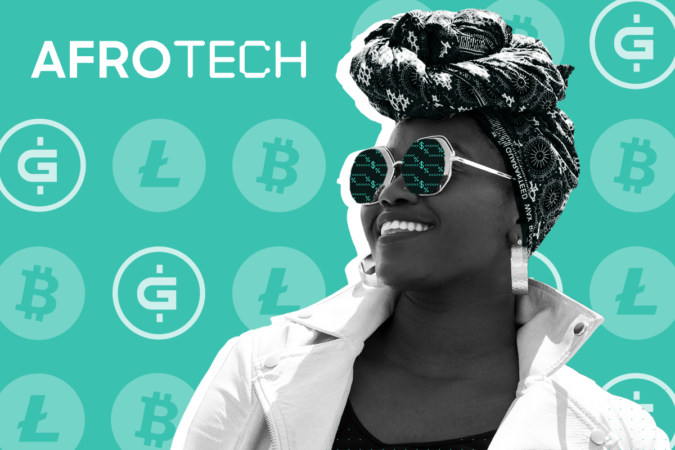As cryptocurrency and blockchain gain traction across the world, more Black women are entering the space, building companies and even creating their own coin.
However, Black women thriving in this growing sector say their work is going unseen.
The cryptocurrency market is fairly new and coins like Bitcoin, Ethereum and Litecoin have become the most popular, but anyone can create a cryptocurrency.
“Bitcoin set a precedent for how you popularize a currency and how to add value to it,” said Tavonia Evans, creator of Guap Coin. “A lot of people don’t have the understanding that cryptocurrency is real money. You can really use it, you can cash it out.”
Evans created Guap Coin as a way to support Black-owned businesses and philanthropic initiatives.
“It’s one thing to support Black businesses and to buy Black, but if you don’t have a platform to be able to see how it’s growing and how it has an impact, then it becomes a movement that dies,” Evans said.
Guap Coin was originally built on the Ethereum network, but Evans revamped the coin in October with her own blockchain. She said she wants Guap Coin to maintain an independent network to emphasize the goal of the coin.
Blockchain and cryptocurrency are not the same — cryptocurrency uses blockchain to secure trades and records across industries.
Organizations like Black Women Blockchain Council and the Black Woman’s Guide to Crypto and Blockchain provide networking events, workshops, and tools for Black women to learn more about the technologies.
McKenzie Slaughter, a member of the Black Women Blockchain Council, said that Black women in America’s blockchain and cryptocurrency circuit are going unseen.
“We’re in the space, but we’re just not promoted,” said Slaughter.
Slaughter is the co-CEO and chief investment officer of Beyond Capital Markets, a fintech, and social impact firm that uses blockchain and cryptocurrency to help companies grow. Beyond Capital Markets is currently helping Caribbean countries build a financial infrastructure around cryptocurrency.
“For us, it’s a global play — we’re not U.S. focused,” said Slaughter.
In a 2015 Atlantic piece entitled, “Why are So Few Black People Using Bitcoin?“, writer Kyle Coward points to two studies focusing on Bitcoin use among African Americans. According to a 2015 report by the Conference of State Bank Supervisors and the Massachusetts Division of Banks, African Americans are less likely to have heard about cryptocurrencies compared to their White and Hispanic counterparts. A 2014 study revealed that African Americans are less likely than Whites and Hispanics to know “a lot” about Bitcoin.
Slaughter said there are a notable amount of Black women in Africa who are investing in cryptocurrency, but the movement has not yet hit Black women in the U.S.
According to the Ibinex Global Cryptocurrency Report Market, only 8 percent of Americans plan on owning cryptocurrency in the future.
Women make up a mere 8.9 percent of cryptocurrency owners in the U.S. compared to men who own more than 20 percent.
“Our ecosystem is not built,” Slaughter said. “There’s cryptocurrency ecosystems being built in Africa and in the Caribbean out of necessity because their currency is very inflated.”
Nurucoin, the cryptocurrency used across borders in Africa, gained traction in late 2017 because it made trading goods easier by eliminating heavy exchange rates.
Slaughter said without a financial emergency in the U.S., it is unlikely that cryptocurrency will latch on; however, more companies are looking toward blockchain to secure their records and processes.
Patientory Inc., a SaaS company in beta, was founded in 2017 by Chrissa McFarlane. Its purpose is to better manage medical information without traditional electronic medical records systems, which make it difficult to transfer information from one system to another. Patients and medical professionals use the platform to securely store, share and track health information through blockchain.
McFarlane said she entered the space knowing she would be a rarity.
“Similar to other industries, there’s a bro-culture,” McFarlane said. “When Black women see that type of culture, they see that they don’t fit in.”
It’s no secret the tech industry is a White male-dominated field. Black women face funding and networking hurdles when trying to enter into the blockchain and cryptocurrency space.
“A lot of us are bootstrapping and using our own funds,” Evans said. “It’s hard, so it’s slower for us to get to into the market.”
Evans said finding funding can be one of the most difficult challenges for Black women in blockchain and cryptocurrency.
“The problem isn’t that we don’t know the right people,” Evans said. “The problem is that they aren’t giving us money.”
Evans said many of the investors are not interested in the initiatives Black women bring to blockchain because they target “problems that are indigenous to people of color.”
“Investors in Silicon Valley don’t care about what Black women care about,” said Slaughter. “They don’t see the point in investing in what we care about.”
Slaughter and Evans each said they look to the Black Women Blockchain Council and other Black women in the field for support and inspiration.
“It’s almost like we’re invisible,” Slaughter said. “But we are here.”

